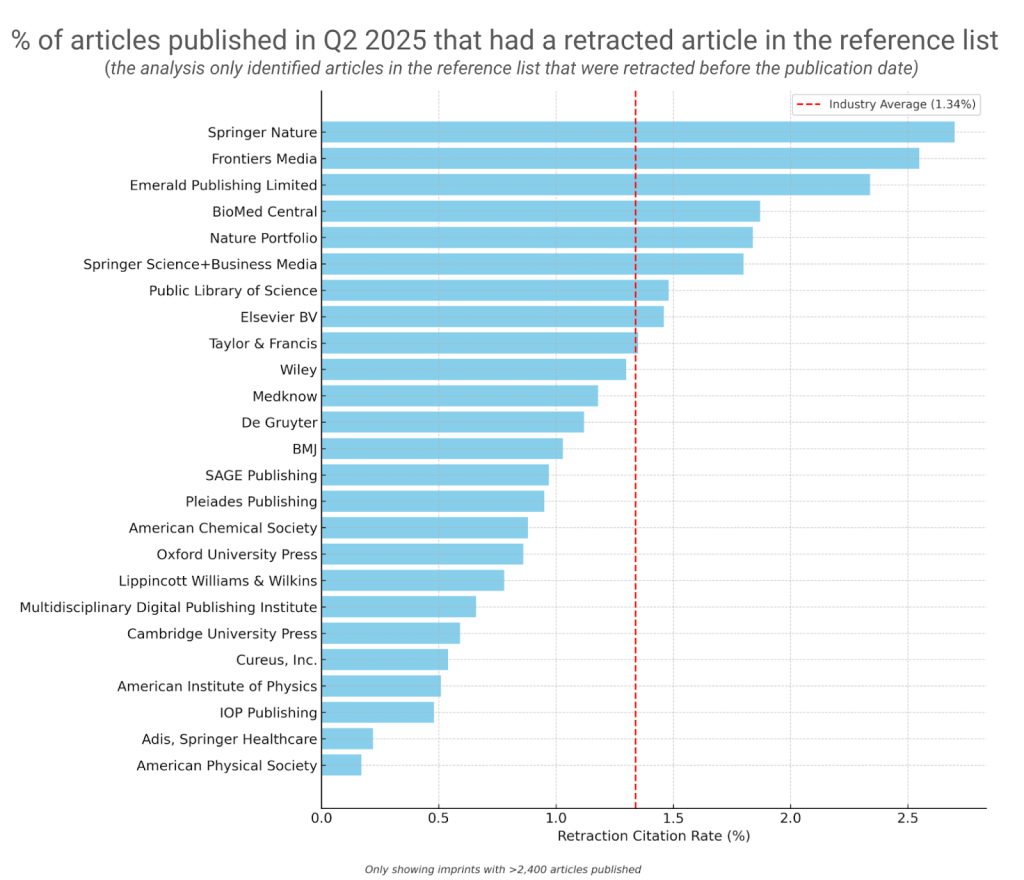A fresh look at articles published in the second quarter of 2025 continues to shed light on a critical challenge in academic publishing: the persistent citation of retracted research. Even when retractions are known and documented prior to publication, they still find their way into new scholarly work.
Scitility’s latest analysis spans publishing imprints with more than 2,400 articles published in Q2, offering a comprehensive and representative view of industry performance. The updated data shows that there has been a marginal decline, retracted references remain a concern. Highlighting systemic gaps in citation verification and oversight.

What the Data Shows
- The industry average retraction citation rate in Q2 is 1.34%, slightly higher than Q1’s 1.315%.
- Citation rates range from as low as 0.17% to as high as 2.7% among large-scale publishers.
- 9,445 articles again in Q2 contained references to papers that had been retracted prior to publication.
This is not an isolated issue. It’s an industry-wide concern that affects the reliability and integrity of the scholarly record.
Why Retractions Still Get Cited?
Several contributing factors remain consistent quarter over quarter:
- Authors may not know that a referenced article has been retracted, particularly if their citation tools or databases lack real-time updates.
- Legacy reference managers and static citation libraries contribute to outdated bibliographies.
- In rare cases, retracted articles are cited deliberately for discussion or critique. However, our analysis filters out obvious examples to focus on unintentional citations.
- Editorial workflows may rely on outdated datasets, resulting in undetected issues during peer review or copyediting.
Regardless of the cause, the consequences are serious. Retracted research in citations can distort findings, mislead readers, and erode public trust in science.
How Scitility Can Help?
Checking every reference manually is impractical given the volume of scholarly publishing. That’s why automated, scalable solutions are essential.
The Scitility Reference API helps publishers, research institutions, and authors maintain reference quality at scale by:
- Offering access to the most complete, authoritative source of retraction data.
- Easy user interface to automatically scan reference lists to detect retracted publications in real time.
- API integration into editorial and peer review platforms to catch issues before articles are published.
This technology-first approach reduces the likelihood of retracted work resurfacing in new research, improving both quality control and institutional reputation.
Looking Ahead
The Q2 2025 data shows the issue of retracted citations remains prevalent. The path forward lies in better tooling, increased awareness, and industry-wide collaboration.
For a research ecosystem that values rigor and transparency, ensuring reference accuracy is not a luxury, it’s a necessity and we have tooling that is available for all publishers both big and small.

